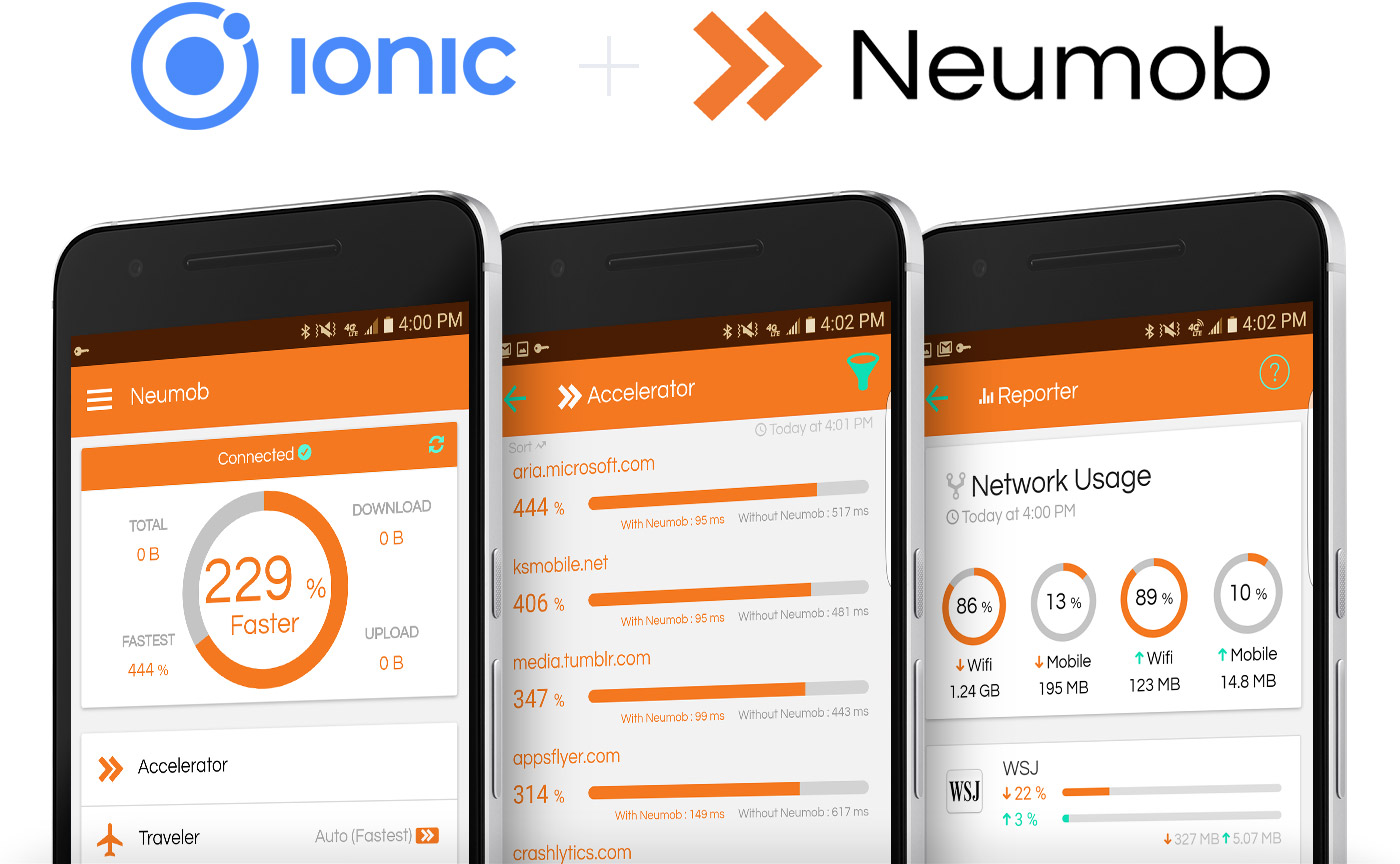Built with Ionic: Neumob

Neumob focuses on app acceleration for a mobile-first world, making mobile app load times and in-app performance much faster. App owners anywhere in the world install a two-line SDK into their mobile apps, and all wireless traffic is accelerated by 30%-300%.
“This helps app owners maximize revenues and keep the users they’ve worked so hard to acquire,” says Neumob Senior Software Engineer Young Park, who primarily focuses on UI development at the company. “It’s especially helpful for apps that find they’re not able to deliver images, videos, or even just basic content calls as fast as they’d like on the world’s unpredictable mobile networks.”
Neumob focuses on app owners and app developers who are focused on app performance and user experience. The Neumob app is available for iOS and Android.
“We’ve had a lot of success with apps where there’s a crucial need for speed—financial trading, travel and airlines, mobile gambling, and media/news/sports apps,” says Park. “For mobile development, there are a lot of services that speed up development, like ‘backend as a service’ platforms, such as Back4app and Firebase; and mobile app analytics, like Fabric, Apteligent, New Relic, and Google Analytics (for mobile). Yet no company accelerates mobile apps the way we do.”
Park has used Ionic since the beta version of Ionic 1.
“I have a web developer background and was curious about using HTML technology to build mobile apps, ever since jQuery mobile came out,” he says. “However, at the time, when I investigated using the Cordova/PhoneGap application, the UI framework wasn’t quite there yet, so building mobile apps with HTML technology was a very frustrating experience. After learning AngularJS, I found out about the Ionic framework from the developer community of AngularJS, and immediately started to dive into it.”
As a UI engineer at Neumob, Park is in charge of building Neumob’s consumer-focused app called Neumob – Internet Booster (for Android), which is built with Ionic 1. Internet Booster is a VPN app that enables users around the world to connect to Neumob’s cloud-based acceleration network and speed up all the network calls for any app or browsing activity on their device.
“We decided to go hybrid for the Internet Booster, because with Ionic’s framework, every UI component was there already, and since I was already familiar with building HTML apps, using the Ionic framework was the best way for me to create a high-functioning mobile app fast,” says Park. “The VPN portion is done as a Cordova plugin, since it requires a native API to open/close the VPN connection. ngCordova is not required, but it’s useful when using a Cordova plugin with a simple JavaScript interface. Many people still say that hybrid apps are slower than native apps, but nowadays, mobile browsers are powerful enough to render HTML smoothly, and thus I don’t believe that hybrid apps are necessarily slower than native apps any longer.”
With the Neumob Cordova Plugin, all Cordova apps that use Ionic can be accelerated easily.
“You don’t need any of the legacy CDN providers,” says Park. “One single line of JavaScript will accelerate all the network calls for all of your audiences around the world.”
Neumob is using Ionic 2 for an internal mobile app.
“With Ionic 2, I felt the app was even smoother and more responsive than with Ionic 1,” says Park. “Also, Ionic 2 uses TypeScript by default and makes your JavaScript strongly typed, meaning it will catch most of the small typos and errors in your code while it compiles. There is no reason for me to develop native apps anymore, unless the app depends heavily on Native APIs.”
Park notes that in addition to hybrid apps saving time by using a single code base for multiple platforms, Cordova plugins are huge time-savers, too.
“For example, while implementing in-app-purchase, I spent only one or two days with the Cordova-plugin-purchase plugin, which means if you have an awesome idea, with the Ionic framework you’re able to produce apps as fast as you can to different platforms like Android, iOS, and even Windows” says Park. “Ionic 2 is also built with AngularJS 2, which means better performance and therefore better results.”
Park adds that hybrid apps are not limited to mobile devices, but can also be produced for desktop and for mobile web apps.
“Therefore, they can be much more powerful than commonly thought,” he explains. “Ionic can be even used with electronJS to build desktop apps, such as Slack.”


